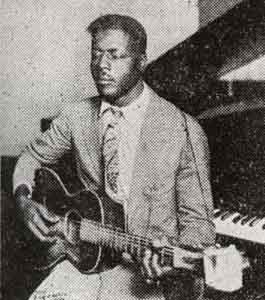Blind Willie Johnson – A Complete Biography
Introduction
Blind Willie Johnson (1897–1945) was a gospel-blues evangelist whose bottleneck slide guitar and thunderous, sermon-ready voice distilled sorrow, hope, and faith into recordings that still sound timeless. Between 1927 and 1930 he cut roughly thirty songs for Columbia Records. Among them, “Dark Was the Night, Cold Was the Ground,” a wordless moan over keening slide guitar, later traveled aboard NASA’s Voyager Golden Record as a sonic portrait of humanity for the universe.

Childhood
The exact birthplace of Johnson remains uncertain, with some accounts citing Independence near Brenham, Texas, and others pointing to Pendleton near Temple. He was born in 1897 and grew up in rural central Texas. His early life was marked by hardship. According to oral tradition, a childhood incident—often described as being blinded during a family dispute involving lye—left him without sight. From that point forward, he turned fully to sacred song and the guitar, finding in music a way to channel both his suffering and his faith.
Youth
By his teenage years, Johnson was a street-corner singer and lay preacher. He performed in small Texas towns and larger hubs alike, often with a tin cup tied to his guitar to collect donations. His repertoire drew heavily from spirituals and church hymns, delivered with the urgency and grit of a revival meeting. During these years, he honed the fierce slide guitar technique and powerful vocal style that would later define his recordings. The “false-bass” growl of his voice gave his performances an otherworldly authority that set him apart from other musicians of his era.
Adulthood
Johnson’s professional career blossomed when Columbia Records talent scout Frank Buckley Walker brought him into the studio. Between December 1927 and April 1930, Johnson recorded in Dallas, New Orleans, and Atlanta, leaving behind thirty canonical sides. Many of these featured the answering voice of Willie B. Harris, widely believed to have been his first wife. Later accounts indicate he may have married again, to Angeline (Anna) Robinson.
In April 1930, during a session in Atlanta, Johnson recorded enduring works such as “John the Revelator” and “The Soul of a Man.” After his recording career ended, Johnson continued to busk, preach, and lead services. City directories from Beaumont, Texas, list him as “Rev. W. J. Johnson” at the House of Prayer, evidence that he never abandoned his role as a preacher even as his national profile faded.
Major Compositions
Johnson’s music was not blues in the secular sense but sanctified testimony set to guitar. Several of his compositions have since become legendary:
- “Dark Was the Night, Cold Was the Ground” (1927): A near-wordless meditation on Christ’s Passion that later represented humanity on the Voyager spacecraft.
- “John the Revelator” (1930): A powerful call-and-response track performed with Willie B. Harris, rooted in apocalyptic scripture.
- “The Soul of a Man” (1930): A probing theological piece questioning the essence of the human spirit.
- “Jesus Make Up My Dying Bed,” “It’s Nobody’s Fault but Mine,” “Mother’s Children Have a Hard Time,” and “If I Had My Way (Samson and Delilah)” (1927–1928): Songs from his debut sessions in Dallas that went on to influence countless artists in both gospel and blues traditions.
These compositions, filled with conviction and raw emotion, have since become touchstones for musicians ranging from gospel choirs to rock icons.
Death
Johnson died in Beaumont, Texas, on September 18, 1945. His death certificate lists malarial fever as the cause, with other contributing conditions noted. Stories told by his wife Angeline recall a devastating house fire that forced Johnson to sleep on damp bedding, leading to his decline. Racial discrimination of the era may also have played a role in his lack of access to proper medical treatment. He was buried in Beaumont’s Blanchette Cemetery. His exact gravesite was lost to time, though local historians later commemorated his life with a marker.
Conclusion
Blind Willie Johnson fused pulpit fervor with knife-edge slide guitar to create a body of work that feels both ancient and futuristic. His recordings, made in less than three years, have echoed from the streets of Texas to the farthest reaches of space. His legacy lies not only in the haunting beauty of his music but also in its enduring power to move listeners with faith, sorrow, and unshakable conviction.

Comments are closed